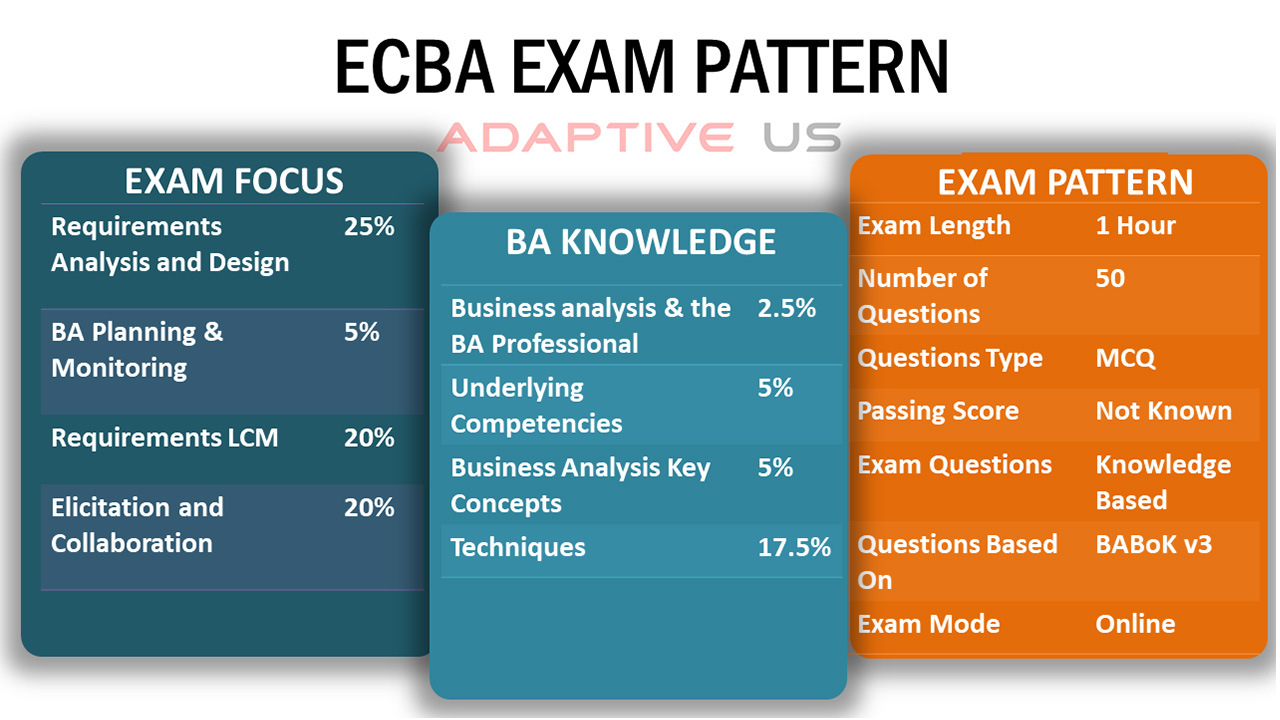Embark on the ECBA Exam preparation journey with us! This comprehensive guide will equip you with everything you need to conquer the exam and excel in business analysis. From exam domains and study strategies to practice questions and industry insights, we’ve got you covered.
Whether you’re a seasoned professional or just starting your business analysis career, this guide will provide you with the knowledge and tools to achieve your ECBA certification goals.
ECBA Exam Overview
The ECBA exam is the entry-level certification for business analysts. It is designed to assess your knowledge of the fundamental concepts of business analysis. The exam is offered by the International Institute of Business Analysis (IIBA).
To be eligible to take the ECBA exam, you must have at least 750 hours of business analysis experience. You must also have a high school diploma or equivalent.
The ECBA exam is a computer-based exam. It consists of 120 multiple-choice questions. You have three hours to complete the exam.
The ECBA exam is divided into seven knowledge areas:
- Business Analysis Planning and Monitoring
- Elicitation and Collaboration
- Requirements Life Cycle Management
- Strategy Analysis
- Solution Assessment and Validation
- Business Analysis Communication
- Business Analysis Tools and Techniques
The ECBA exam is a challenging exam, but it is also a rewarding one. Passing the ECBA exam demonstrates your commitment to the business analysis profession. It also shows that you have the knowledge and skills to be a successful business analyst.
Exam Domains and Knowledge Areas

The ECBA exam encompasses three domains, each consisting of several knowledge areas. Understanding these domains and their corresponding knowledge areas is crucial for effective exam preparation.
The three domains are:
- Business Analysis Planning and Monitoring
- Elicitation and Collaboration
- Strategy Analysis
Business Analysis Planning and Monitoring
This domain covers the foundational principles of business analysis, including:
- Planning and managing business analysis initiatives
- Defining and prioritizing business requirements
- Monitoring and controlling business analysis activities
Elicitation and Collaboration
This domain focuses on the techniques and skills for gathering and understanding stakeholder needs. Key concepts include:
- Interviewing and facilitation techniques
- Documenting and analyzing stakeholder requirements
- Managing stakeholder relationships and expectations
Strategy Analysis
This domain explores the role of business analysis in supporting organizational strategy. Key areas include:
- Understanding business context and industry trends
- Conducting SWOT and other strategic analyses
- Developing and evaluating business cases
The following table summarizes the exam domains, knowledge areas, and key concepts:
| Domain | Knowledge Area | Key Concepts |
|---|---|---|
| Business Analysis Planning and Monitoring | Planning and Managing Business Analysis Initiatives | – Initiating and planning business analysis projects – Managing scope, schedule, and resources – Monitoring and controlling progress |
| Business Analysis Planning and Monitoring | Defining and Prioritizing Business Requirements | – Eliciting and documenting stakeholder requirements – Prioritizing requirements based on business value – Managing requirements changes |
| Business Analysis Planning and Monitoring | Monitoring and Controlling Business Analysis Activities | – Tracking and reporting on progress – Identifying and mitigating risks – Ensuring stakeholder satisfaction |
| Elicitation and Collaboration | Interviewing and Facilitation Techniques | – Planning and conducting effective interviews – Facilitating workshops and meetings – Building rapport and managing stakeholder expectations |
| Elicitation and Collaboration | Documenting and Analyzing Stakeholder Requirements | – Capturing and documenting requirements – Analyzing requirements for completeness, consistency, and feasibility – Managing requirements traceability |
| Elicitation and Collaboration | Managing Stakeholder Relationships and Expectations | – Identifying and managing stakeholder interests – Communicating effectively with stakeholders – Managing stakeholder expectations and resolving conflicts |
| Strategy Analysis | Understanding Business Context and Industry Trends | – Analyzing the organization’s mission, vision, and goals – Understanding the industry landscape and competitive environment – Identifying potential opportunities and threats |
| Strategy Analysis | Conducting SWOT and Other Strategic Analyses | – Performing SWOT and other strategic analyses – Identifying strengths, weaknesses, opportunities, and threats – Developing and evaluating strategic options |
| Strategy Analysis | Developing and Evaluating Business Cases | – Developing and presenting business cases – Analyzing the financial and non-financial benefits of projects – Assessing the risks and uncertainties associated with projects |
In summary, the ECBA exam covers a wide range of topics essential for business analysts. Understanding the exam domains and knowledge areas, as well as the key concepts within each area, is crucial for effective exam preparation.
Preparing for the ECBA exam? One crucial aspect to master is Requirements Discovery for Business Analysts. By understanding how to gather, analyze, and document requirements, you’ll enhance your ability to bridge the gap between business needs and technical solutions. Check out this insightful article Requirements Discovery for Business Analyst to expand your knowledge and excel in your ECBA preparation.
Study Materials and Resources: ECBA Exam Preparation

Selecting the right study materials can significantly enhance your ECBA exam preparation journey. Consider your learning style, time constraints, and financial resources when choosing resources that align with your needs.
Preparing for the ECBA exam? If you’re looking for a solid foundation in business analysis fundamentals, I highly recommend checking out Business Analysis Fundamentals – ECBA, CCBA, CBAP . This comprehensive resource will guide you through the core concepts you need to master for the ECBA exam, ensuring you’re well-equipped to succeed.
Reputable sources for ECBA study materials include:
Books
- ECBA: A Guide to the Business Analysis Body of Knowledge, 3rd Edition by IIBA
- Mastering the ECBA: A Step-by-Step Guide to Passing the ECBA Exam by Anthony J. Colaprete
Online Courses
- ECBA Exam Preparation Course by IIBA
- ECBA Certification Training Course by Simplilearn
Practice Exams
- ECBA Practice Exam by IIBA
- ECBA Mock Exam by PMI
Study Plan and Time Management

Creating a study plan is essential for ECBA exam preparation. Allocate time for each domain, including writing practice. Balance study with other commitments using a daily or weekly timetable. Optimize study sessions with techniques like the Pomodoro technique or spaced repetition. Utilize time management tools like apps or online calendars. Set realistic goals and break tasks into manageable chunks. Prioritize tasks based on importance and urgency.
Time Allocation
Allocate specific study hours for each ECBA domain. Include time for writing practice to enhance your comprehension and application skills.
Balancing Commitments
Create a daily or weekly timetable that accommodates study time alongside other commitments. Stick to the schedule as much as possible to maintain consistency.
Optimizing Study Sessions
Use the Pomodoro technique: Alternate between focused study sessions and short breaks to improve concentration and retention.
Incorporate spaced repetition: Review material at increasing intervals to strengthen memory and recall.
Time Management Tools
Utilize time management apps or online calendars to track study progress and stay organized. Set reminders and use task lists to stay on top of your schedule.
Realistic Goals and Task Management
Set achievable study goals and break down tasks into smaller, manageable chunks. This will reduce overwhelm and make the study process feel less daunting.
Task Prioritization
Prioritize tasks based on importance and urgency. Focus on essential concepts and areas where you need improvement first. Delegate or defer less critical tasks when possible.
Exam-Taking Strategies

The ECBA exam is a challenging one, but with the right strategies, you can maximize your performance on exam day. Here are some tips to help you manage your time, answer questions effectively, and handle stress:
Time Management
- Read the instructions carefully and allocate your time wisely.
- Don’t spend too much time on any one question. If you’re stuck, move on and come back to it later.
- Use the process of elimination to narrow down your choices.
- Don’t be afraid to guess if you’re not sure about an answer.
Answering Questions Effectively
- Read each question carefully and make sure you understand what it’s asking.
- Identify the key words in the question and use them to guide your answer.
- Be concise and to the point in your answers.
- Use examples to support your answers.
Handling Stress
- Take a deep breath and relax before you start the exam.
- Focus on one question at a time.
- Don’t let negative thoughts creep into your mind.
- Believe in yourself and your ability to succeed.
Certification Maintenance

To ensure the relevance and value of your ECBA certification, it’s crucial to stay abreast of industry best practices and advancements. The ECBA certification requires periodic renewal to maintain its validity.
If you’re prepping for the ECBA exam, don’t overlook the significance of User Acceptance Testing (UAT). It plays a crucial role in ensuring that software meets the needs of end-users. Check out this comprehensive guide on User Acceptance Test – UAT to gain insights into its process, best practices, and how it contributes to successful ECBA Exam preparation.
Maintaining your ECBA certification involves fulfilling specific requirements, including earning continuing education credits (CECs) and adhering to the Code of Professional Conduct. CECs can be obtained through various professional development activities, such as attending conferences, workshops, or completing online courses.
Cracking the ECBA exam is no cakewalk, but fear not, for there’s a secret weapon that’ll elevate your prep game. Dive into the realm of Advanced Business Analysis , where you’ll unravel the complexities of business processes and decision-making. Armed with this knowledge, you’ll return to your ECBA studies with newfound clarity and confidence, ready to conquer the exam and unlock your business analysis superpowers.
Benefits of Certification Maintenance, ECBA Exam preparation
- Staying up-to-date with industry trends and best practices enhances your knowledge and skills, making you a more valuable asset to your organization.
- Continuous learning helps you adapt to evolving technologies and methodologies, ensuring your expertise remains relevant.
- Maintaining your certification demonstrates your commitment to professional growth and sets you apart as a dedicated practitioner.
Case Studies for ECBA Exam Preparation

Yo, ECBA aspirants! Case studies are like the ultimate boss battle in the ECBA exam. They test your ability to apply concepts to real-world scenarios. So, let’s dive into some case studies and slay those questions!
Case Study Analysis
1. Project Name: E-commerce Platform Revamp
– Industry: Retail
– Project Type: Software Development
– Key Issues: Outdated technology, poor user experience, slow loading times
– Proposed Solutions: Implement modern technologies, redesign user interface, optimize website performance
– Evaluation of Solutions: Increased sales conversions, improved customer satisfaction, reduced bounce rates
2. Project Name: Hospital Expansion Project
– Industry: Healthcare
– Project Type: Construction
– Key Issues: Budget constraints, limited space, complex regulations
– Proposed Solutions: Explore alternative funding sources, optimize space utilization, comply with all regulatory requirements
– Evaluation of Solutions: Successful project completion within budget and on schedule, improved patient care
3. Project Name: Product Launch Campaign
– Industry: Marketing
– Project Type: Marketing Campaign
– Key Issues: Lack of brand awareness, low engagement, limited budget
– Proposed Solutions: Create targeted marketing strategies, leverage social media, optimize advertising campaigns
– Evaluation of Solutions: Increased brand recognition, higher customer engagement, improved sales
Reflective Writing
After going through these case studies, what insights did you gain? How do these scenarios reflect the ECBA concepts you’ve learned? Share your thoughts in the comments below!
Additional Resources

Expanding your knowledge beyond the core study materials is essential for comprehensive ECBA exam preparation. Utilize the following resources to enhance your understanding and solidify your skills.
Explore websites, articles, and tools dedicated to ECBA exam preparation, offering valuable insights and practice questions. Additionally, consider enrolling in certification preparation courses, workshops, or mentoring programs to gain expert guidance and structured support.
Websites, Articles, and Tools
- PMI ECBA Exam Page: Official website providing exam details, study materials, and practice questions.
- ECBA Exam Central: Comprehensive resource with study guides, practice tests, and exam tips.
- Agile Alliance ECBA Exam Study Guide: In-depth guide covering exam domains and knowledge areas.
Certification Preparation Courses and Workshops
- PMI ECBA Exam Prep Course: Official course offered by PMI, covering all exam topics.
- AgileEDU ECBA Exam Workshop: Interactive workshop with hands-on exercises and expert instruction.
Mentoring Programs
- PMI Mentoring Program: Connect with experienced professionals for guidance and support.
- ECBA Exam Mentorship Network: Online platform connecting candidates with mentors.
Conclusion

With the strategies and resources Artikeld in this guide, you’ll be well-prepared to tackle the ECBA Exam with confidence. Remember, success is not just about passing the exam; it’s about embracing the principles of business analysis and applying them effectively in your professional endeavors. We wish you all the best in your preparation and look forward to celebrating your success.
FAQ Summary
What is the ECBA exam format?
The ECBA exam consists of 120 multiple-choice questions, which you have 3 hours to complete.
What topics are covered on the exam?
The exam covers a wide range of business analysis topics, including requirements elicitation, analysis, modeling, and evaluation.
What are the eligibility requirements for taking the exam?
To be eligible to take the ECBA exam, you must have a high school diploma or equivalent and at least two years of experience in business analysis.
How can I register for the exam?
You can register for the ECBA exam online through the International Institute of Business Analysis (IIBA) website.
How much does the exam cost?
The cost of the ECBA exam varies depending on your location and IIBA membership status.

